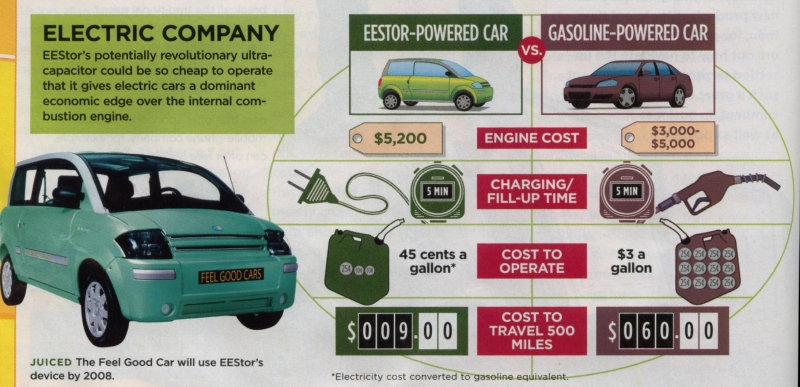
EEStor Inc is a Texas based startup that has been working in stealth mode for years to develop a disruptive breakthrough battery technology which would be extremely useful in electric cars. The material they use is called Barium Titanate (composition modified) and has already been demonstrated to have extremely high permittivity, which means is can hold tremendous amounts of energy. Batteries made from this material would be several times lighter and less expensive than lithium-ion batteries, will not degrade over charge-discharge cycles, and could be recharged in minutes.
We recently heard from the CEO of ZENN Motors (ZNN.V) who is seeking to commercialize the ESU batteries for automotive use that the batteries were about to be publicly demonstrated for the first time, with proof they can hold energy at high voltage by September. ZENN is a 10 percent owner of EEStor, Inc.
An extensive audio interview with the normally silent Dick Weir, founder of EEStor, has been leaked to the web. The 38 minute interview with an unknown interviewer took place in last month, and his identity has been confirmed by anonymous sources.
This is the first time in history we are give such extensive public details of the inner workings and validity of what EEStor is doing.
Weir explains that barium titanate has long been known to have high energy storage capacity but that previous workers had failed to successfully harness that property because of ineffective chemical engineering. He explains how EEStor realized a milling process wouldn't work and how they invented a specialized aqueous process.
"We've done a great job because a lot of this stuff has been out here over 3 years, 3 1/2 years, and no degradation whatsoever," he says. "I mean zero. So we're very happy that we really have superior chemistry here and from the aqueous process."
He explains how high purification is extremely important to remove sodium and potassium which has resistance and block the chemical ability to operate at high voltage. He also noted the importance of coating the powder with aluminum oxide which they've done and "sealed in all the goodness," preventing particles from talking to one another. He confirmed the material has been certified as pure. Finally he notes that through other processes EEStor was able to achieve a high permittivity operating in the deep ferroelectric phase. As Weir puts it "we knew we'd hit the home run then," and "the permittivity was 22,500 and or higher." He noted their goal was 18,500 and that their tests "shows 22,500 and greater...we're just not going to tell how great it is."
He mentioned they've passed all their milestones and have put ZENN's recent $700,000 payment "to very good use."
"We're actually installing our stuff now to go into ESU production," he said. "And we've told the world that you can anticipate us being in a proto in a pre-production mode of ESUs by the 4'th quarter this year."
He notes since it is now June (at the time of the recording), "I'm ahead of schedule."
He says the ramp up of production is modular and inexpensive. He says "you get the hardware quick enough to actually ramp up and put your lines in at a very effective time frame." And he notes it doesn't cost $5 million for a piece of assembly equipment but rather "it's more in the neighborhood of something $50,000 and I can buy it off the shelf...Very cost effective and time effective."
He explains how the basic ingredient Barite is very readily available, much more so than lithium. He says that Barite used to be used in cathode ray TVs which are now a thing of the past so therefore his company is "the best friend the Barium company's got in the world."
Barite is mined in the US, and EEStor is working and likely to get the sole rights to a new mine just discovered in Nevada. He notes that even without that mine "the United States Geological Service says there's at least 2 billion tons of (barite) in known reserves."
He compares that to the fact that most lithium is found in Chile and China, and warns "if you think we're in trouble with oil, wait till you have to go to China to get your Lithium."
Weir indicates that a company in California is "actually putting the ZENN circuits together literally as we speak" to create ESUs for ZENN's cars. He said UL certification will soon be forthcoming.
In fact he notes the UL is ecstatic about ESUs because they're s composed of "a fusible link design". He notes that if one component shorts "nothing bad is going to happen." It will simply short out "the fusible link on just one component."
"There's nothing corrosive, harmful {or} explosive in our technology," he says. "If it is in a car and gets crumpled up, you'll blow all the fusible links and you're totally safe."
He actually gives the pricing of ESUs at "$100 to $150 per kWh, excluding electronics" which is what ZENN will pay. This is about one fifth to one tenth the cost of lithium-ion batteries.
Weir realizes the gold mine he is sitting on and its worldwide dramatic and disruptive potential.
"We anticipate being in a production base of pre-production units in the fourth quarter this year, (and) I'm already out there putting EESUs together and I'm still in June," he says. "So, it looks like I'm a little ahead of schedule."
And he predicts once ZENN gets and demonstrates its pre production units by the end of this year, "all hell's going to break loose with ZENN and at EEStor."
You can say that again.
Source (TheEEStory.com)












